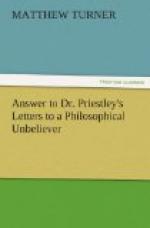I declare I am rather pleased there are so few atheists than at all anxious to make more. I triumph in my superior light. I am like the Jew or the Bramin who equally think themselves privileged in their superior knowledge of the Deity. With me and with my friend the comparison holds by way of contrast, for we are so proud in our singularity of being atheists that we will hardly open our lips in company, when the question is started for fear of making converts, and so lessening our own enjoyment by a numerous division of our privilege with others. It has indeed often been disputed, whether there is or ever was such a character in the world as an atheist. That it should be disputed is to me no wonder. Every thing may be, and almost every thing has been disputed. There are few or none who will venture openly to acknowledge themselves to be atheists. I know none among my acquaintance, except that one friend, to whom as a Philosophical Unbeliever I presented your Letters, and to whose answer I only mean this address as an introduction. I shall therefore not enter here into the main argument of Deity or no Deity. My address is only preliminary to the subject; but I do not therefore think myself precluded from entering into some considerations that may be thought incidental to it. I mean such considerations as whether immorality, unhappiness or timidity necessarily do or naturally ought to ensue from a system of atheism. But as to the question whether there is such an existent Being as an atheist, to put that out of all manner of doubt, I do declare upon my honour that I am one. Be it therefore for the future remembered, that in London in the kingdom of England, in the year of our Lord one thousand seven hundred and eighty-one, a man has publickly declared himself an atheist. When my friend returned me your Letters, addressing me with a grave face he said, “I hope, if you have any doubts, these Letters will have as good effect upon you as they have had upon me.” My countenance brightened up and I replied, “You are then, my friend, convinced ?” “Yes, he said, I am convinced; that is, I am most thoroughly convinced there is no such thing as a God.” Behold then, if we are to be believed, two atheists instead of one.
Another question has been raised “whether a society of atheists can exist?” In other words “whether honesty sufficient for the purposes of civil society can be insured by other motives than the belief of a Deity?” Bayle has handled that question well. [Footnote: Pensees sur la Comete.] Few who know how to reason (and it is in vain to speak or think of those who lay reason out of the case) can fail to be convinced by the arguments of Bayle. I shall discuss the question no farther than as it is necessarily included in the discussion of some of those supposed results of atheism, such as I have before mentioned in the instances of immorality, unhappiness and timidity. In my argument upon this subject I shall carefully avoid all abuse and ridicule.




